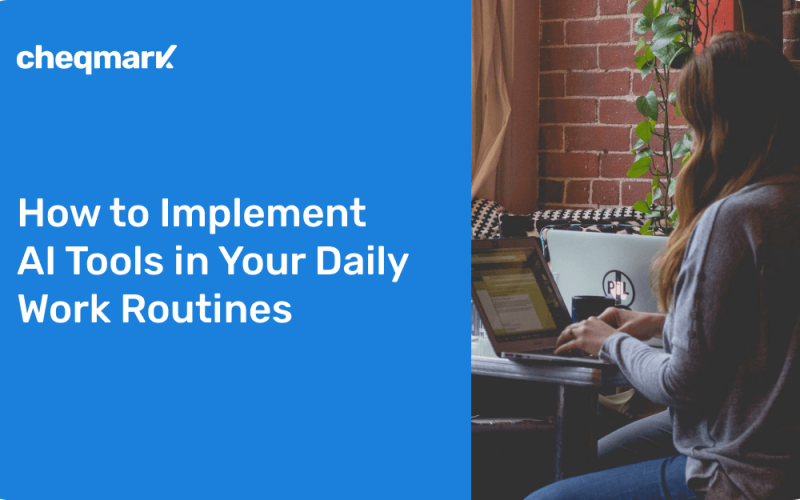In the corporate sector, AI has progressed from an abstract concept to a critical component facilitating numerous daily operations. Companies use this technology for better efficiency, production, and customer satisfaction. This tech allows businesses to gain deeper insights into their operations and keep ahead of evolving trends. In this way, they ensure their relevancy in today’s market.
This cutting-edge tech helps us in a lot of ways. However, here comes a question: How to implement it? This becomes more perplexing if you don’t know where to start. Keep reading to learn how to use AI to optimize your company’s operation and discover what tools suit different industries.
AI’s Evolution and Its Impact on the Modern World
Artificial Intelligence is rooted in computer science. It focuses on developing software that comprehends its environment and makes decisions based on that knowledge. This can be accomplished using predefined rules and search algorithms or employing machine learning models that spot patterns.
Since its early beginnings, AI has evolved dramatically. From rule-based and statistical techniques, it now offers a more sophisticated approach to dealing with data. AI has progressed via multiple milestones: machine learning, neural networks, and deep learning. This tech can provide deeper insights, predict results accurately, and streamline numerous processes. For example, AI graphics tools like Depositphotos, VistaCreate and AI image generators can create images from text promptly.
The most outstanding feature of AI is that it’s designed to accurately simulate human cognition and behavior. That’s why it’s used in different ways to streamline our daily lives, including voice assistants, on-spot voice and written translation, and even self-driving automobiles that navigate their surroundings.
Common Challenges in Running a Company
Running a business is quite similar to sailing a ship. It’s an exciting trip with ups, downs, and rewards. However, navigating the corporate environment is not as easy as sailing the vast sea. Storms are unavoidable, and these hard times force your company to adapt, develop, and flourish.
There are different difficulties or hurdles that hinder a company’s growth and success. Running a business poses several challenges that need skillful management and strategic planning. These might include the following:
- Financial management. Maintaining financial stability is a never-ending issue for businesses of all sizes.
- Employee management. Building and supervising a productive and cohesive team is critical for enhancing workflow processes and retention. Recognizing achievements with employee appreciation trophies can further boost morale and motivation.
- Regulatory compliance. Understanding complex and changing rules across sectors and jurisdictions requires diligence and knowledge.
- Customer acquisition and retention. Engaging with target audiences, maintaining brand awareness, and providing high-quality customer experiences are critical to attracting and keeping consumers.
- Technology integration. Today’s digital age dictates its rules. So, leveraging technology for many tasks is paramount. However, implementing new systems and responding to new advancements may be expensive and difficult to understand.
- Scaling operations. It’s hard to balance growing and keeping good quality and organization efficiency.
- Keeping up with the trends. Any business goal is to be relevant and keep customers interested in your products and services. To achieve success, you must invest in analyzing and predicting systems.
To address these challenges, business owners used to hire separate workers who could manage each sector. This solution was viable but expensive until the advent of AI. Many businesses take advantage of this powerful technology to streamline numerous operational tasks, saving time and money.
Investing in storyline course development services can help your business create engaging and interactive training programs that captivate your audience. By utilizing storyline course development services, you can ensure your content is not only informative but also visually appealing and easy to understand.
How AI Tools Can Help Different Businesses
According to the evidence, the majority of organizations that have adopted AI actively use generative AI on a daily basis. Furthermore, the use of generative AI has prompted around 40% of these companies to increase their overall AI investment.
Businesses’ long-term goals, growth plans, and available resources all impact their decision to use such technologies. It’s highly versatile when it comes to helping diverse departments. This list includes customer service, research and development, and even finance and accounting. Thus, AI boasts multiple potential applications in various businesses across sectors, offering a Flux 1 of innovative solutions that can streamline processes and enhance efficiency..
AI tools are based on elaborate algorithms and data to perform tasks that require human involvement. It includes cognitive abilities like learning, problem-solving, and decision-making. In this way, they are capable of automating activities, analyzing complicated data, and providing insights. Therefore, they can streamline the following business operations:
- Customer care and connections;
- Marketing campaigns;
- Data detection and analysis for business progress;
- Supply chain and;
- Human resources management;
- Finance and accounting;
- Cybersecurity and data compliance.
Businesses handling sensitive data can leverage AI’s cybersecurity potential to enhance protection measures. An important application is use cases for SOC automation, which helps immediate threat detection and response.
Machine learning models, natural language processing techniques, computer vision systems, and robotic process automation software are some examples. They drive productivity and innovation in healthcare, finance, and many others. AI tools excel at data analysis, pattern recognition, language translation, and autonomous decision-making, transforming how critical duties are completed in the digital age. For businesses handling sensitive data, an anti phishing tool powered by AI can enhance security by identifying and preventing phishing attacks before they cause harm.
How to Apply AI Tools in Your Daily Business Operations
In our fast-paced, technology-driven world, artificial intelligence has enormous potential to alter both personal and corporate undertakings. AI tools frequently deliver faster, more cost-effective, and highly efficient solutions to common business difficulties. Consider the following tips to incorporate this smart tech into your regular activities to achieve the utmost efficiency.
AI and insurtech are transforming the insurance landscape by automating routine processes and providing data-driven insights for better risk management. By leveraging AI and insurtech, companies can offer more personalized and efficient services to their clients, enhancing overall customer satisfaction.
Define the Most Time- and Energy-Consuming Tasks
AI is not a cure-all but rather a solution designed to meet specific business requirements. Instead of applying it generally, concentrate on specific goals such as addressing present problems, accomplishing corporate goals, and improving measurements. At this stage, pinpoint tasks that consume the most resources and are prone to human slip-ups.
Hunt for AI Tools That Fit
Once you’ve identified your pain spots, begin looking for AI solutions that will meet your demands. Working with an AI software consultancy can help you navigate the universe of AI tools and platforms, taking into account variables like language comprehension, data learning capacity, and predictive skills. Consider practical aspects such as cost, ease of interaction with current systems, and scalability.
Test Drive with Small Projects
Before committing fully, dip your toes in with a pilot project. Choose a small, manageable task within your organization to test the AI tool’s capabilities. During the testing process, keep a close eye on its performance and gather feedback from employees involved in the project. This hands-on experience will help you assess its effectiveness and identify any challenges as quickly as possible.
Blend AI into Your Daily Grind
Once you’ve determined that a particular solution works well for your business, integrate it into your daily workflow. At this stage, conduct training sessions and provide support to your team when using the new technology. Ultimately, encourage collaboration between humans and AI systems, emphasizing that they’re there to enhance, not replace, human efforts.
Keep an Eye on Performance and Tweak as Needed
Monitor the performance of the AI tool as it becomes part of your daily operations. At this stage, you need to track key metrics like efficiency gains, cost savings, and customer satisfaction. It’s okay to tweak your approach and adapt to any challenges that arise in the process.
The Future of AI Application in the Business Industry
AI’s impact on our world is still being studied. However, we can certainly claim one thing: a new age of technical advancement has already emerged, and its innovations are here to stay. This means that, in the future, we can expect great progress in all industries.
AI is always improving and developing, so its long-term prospects are bright. The coming implementation of AI in businesses is going to transform the sector. By streamlining routine and more complex tasks, AI will open doors to faster and more productive operations.
By 2024, smart tech is projected to conduct 85% of customer interactions for businesses. As a result, this means deeper insights for better decision-making and tailored consumer experiences.
In operations, AI will simplify supply chains, reducing costs and increasing efficiency. Marketing and sales teams will benefit from tech’s capacity to better target and engage customers. This will result in increased revenues and more satisfied customers.
With a more sophisticated system, AI will also accelerate product development by analyzing data and pinpointing patterns and opportunities. In terms of privacy and security, smart tech will assist in securing the most sensitive data by swiftly detecting and responding to attacks.
With so much power and impact on our world, here comes the question: Will AI replace human work in businesses? Many successful companies are looking at AI as a way to enhance their current efforts. They also strive to support and encourage their employees, not to replace them.
AI researcher David De Cremer and chess grandmaster Garry Kasparov envision a future where both people and smart tech work together in harmony. They call this collaboration the “new diversity.” This shift will require leaders who can build inclusive teams and unite diverse perspectives.
Conclusion
Integrating AI into your organization can significantly change how your operations are conducted. The possibilities are limitless: work automation, data analysis for insights, and increased customer and employee engagement. Companies that effectively deploy AI tools in these areas can increase production and efficiency while also seeing considerable cost savings and growth.
Implementing AI-based tools in businesses promises big transformations and advancements. The future of many companies lies in human-AI partnerships. And enterprises embracing this emerging trend will fully harness AI’s game-changing potential.


